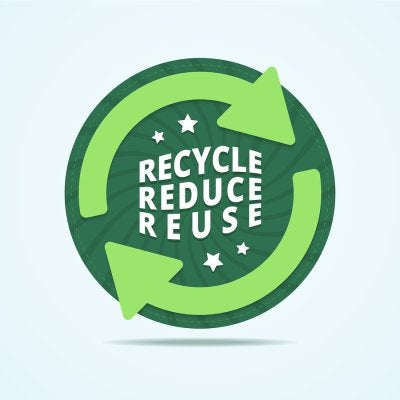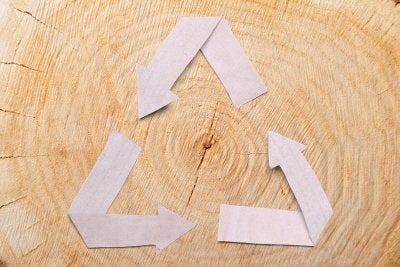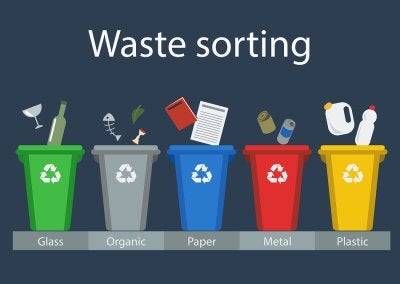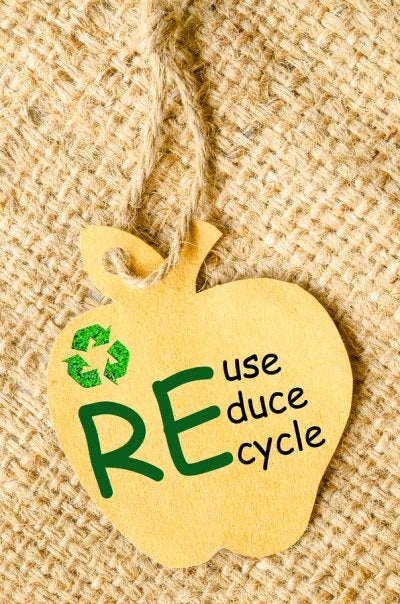-
A Look at E-Waste Recycling
With the boom of technology and electronics, many of us find ourselves with old electronics and devices that are no longer useful. Since electronics contain a variety of chemicals and other elements, E-waste recycling is an essential part of any waste management plan . With E-waste recycling, a recycling center near Atlanta can help you safely get rid of your unwanted electronics. From computers to cell phones and more, a highly rated metal recycling expert will be able to help you recycle all of your electronic waste. To learn more about the process and benefits of E-waste recycling, check out this video from U.S. Environmental Protection Agency.
-
An Inside Look at the Benefits of Recycling
Recycling is an essential part of waste management strategies around the world. By placing your unwanted items in the recycling, rather than the trash, you will be protecting the environment while also keeping our landfills clear. For large scale recycling projects, it is a great idea to contact a company offering roll off dumpster rental near Atlanta. With a roll off dumpster rental, you will be able to dispose of larger quantities of recyclables at one time. Your dumpster rental company can also provide you with more information about what types of materials are suitable for recycling. To highlight the benefits of scheduling a dumpster rental today, here is a look at the great benefits of recycling.

Help to Eliminate Garbage
One of the best reasons to recycle is that recycling is a terrific means for eliminating the generation of garbage. In the past few decades, Americans have been sending more garbage to landfills than ever before. In fact, our country dumps more than 100 million tons of waste in our landfills each year. By taking the time to recycle, you will be doing your part to help eliminate garbage.
Reduce Landfill Pollution
Along with reducing the amount of garbage that we produce overall, recycling is also a major step towards reducing the pollution that comes from landfills. When landfills become overfilled with garbage, they can create harmful chemicals and other pollutants and toxins that slowly enter the environment. These pollutants, known as leachate, can be reduced with careful recycling.
Reuse Important Resources
The term “reduce, reuse, recycle” describes another great benefit that recycling has to offer our society and planet. When you recycle metal, paper, or glass, these items will be reused in new applications across various industries. Rather than having to source their materials from new resources, manufacturing companies are now able to use a great majority of recycled materials. With these great benefits in mind, you should be sure to start recycling today!
-
A Closer Look at How Metal Recycling Works
While all recycling serving Atlanta aims to protect the environment by keeping reusable materials out of landfills, not all materials are recycled the same way. When it comes to metal recycling, the steps might even vary between different types of metals. Between aluminum, scrap and precious metals, and steel, metal recycling works in a range of different ways. Feel free to continue on if you would like a closer look at how metal recycling works.

Soda Cans and Other Aluminum
Metal retains its durability each time it is melted down, making it a great candidate for recycling. While there are many different types of metals, aluminum is among the most popular when it comes to recycled products. A metal can might even be recycled into a new can in less than two months . Soda and beer are both popular products in the United States; these products make their way off the shelves almost as soon as they are stocked. This contributes to a great deal of aluminum waste, which many households have done an excellent job of recycling in the past. Families often set aside a specific recycling bin for aluminum cans. They then take this bin to the curb on recycling day so that their cans can be retrieved and recycled.
Scrap and Precious Metals
While an aluminum can may be your prototypical idea of a recyclable product, there are other metal products that can be even more valuable to recycle. Many homeowners who throw out old appliances do not realize that they can actually make money off of these broken machines. This process is not unlike selling a car for parts. Precious metals like gold and silver can also be melted down and reused, and you can fetch a pretty penny in doing so.
Steel Recycling
One of the many benefits of recycling is the ability to create a new product without expending as much energy. This is particularly apparent in the case of steel recycling. You might bring your used steel to a collection center, a supermarket, or simply to the end of your driveway.
-
Recycling Plastic Bottles
Countless different types of materials find themselves in landfills eventually, but many of them break down over time. Used plastic, on the other hand, is one type of waste near Atlanta that continues to take up space indefinitely; this is why it is important that your plastic bottles make it to your recycling bins. Watch this video clip for a look at the importance of recycling plastic bottles.
Recycling plastic bottles is a simple process. You can sort them into your recycling bins and leave them at the curb on recycling days, or you can bring them to recycling centers yourself. Old plastic products will be ground down and sterilized so that the material can be used to create new products. Due to the ease with which you can recycle plastics, many households have gotten on board. As a result, the plastic bottles you use today have already been partially recycled.
-
The Recycling Process
Recycling serving Atlanta has become a cornerstone of the green movement, and it helps keep tons and tons of usable materials in circulation. While you know the truck that comes for trash pickup will bring your garbage to a landfill, you can rest assured that the products in your recycling bins may see the light of day again. Watch this video for a quick overview of the recycling process.
Once you have used a product or finished a meal, you are then faced with the decision of what to do with the remains. The contents of your garbage can will end up in a landfill, but the contents of your recycling bins might end up back on shelves as new products. This helps to save energy, free up space in landfills, and stimulate the economy. If you can find a new purpose for your used materials, you can also reuse them yourself.
-
Looking Back at the History of Recycling
Like many other aspects of modern society, recycling serving Atlanta has been around in some form for many generations. However, recycling of old differed from today’s processes, and it occurred for different reasons. The industrial boom changed the way we manufacture, sell, and purchase products, which had its own impact on recycling, and environmental consciousness has propelled the green movement in more recent years. Read on if you are interested in looking back at the history of recycling.

Recycling by Necessity
Though it may be difficult to picture now, there was a time when products were primarily made by hand. When this was the case, it made the most sense to reuse what you had because it required less energy than creating a new product; this is still a primary benefit of recycling today. The 1930s and 40s saw economic depression that affected a substantial amount of the population. Many families were not able to afford the goods that they needed, so they were forced to recycle their products in order to survive. During the same time, certain materials were rationed for the war. After World War II, however, the societal landscape had changed.
Industrial Boom and Disposability
The United States enjoyed prosperity and a new way of life after the Second World War, and with it came a sense of disposability. The latter half of the 40s and the entirety of the 50s saw a cheap production of goods, which meant that families were able to afford what they needed. Unfortunately this meant that they cared little for what they did not need, and were inclined to throw their used products in the trash. Fortunately society began to regain their environmental consciousness over the course of the following years.
Environmental Consciousness
The 60s and 70s managed to revive society’s appreciation for the planet and the environment. Since the first Earth Day was celebrated in 1970 , the prospect of recycling has gradually picked up traction. It still has a long way to go in terms of total sustainability, but many tons of used products are now recycled regularly.
-
The Facts About Aluminum Recycling
Along with plastic and glass bottles, aluminum cans may be the first product that comes to mind when you think about recycling serving Atlanta . This type of metal recycling can be extremely beneficial to the environment, and it can even offer you a monetary return. Watch this video clip if you would like to pick up a few facts about aluminum recycling.
People generally do a good job of recycling their aluminum cans. This is great news because it means that a substantial amount of usable aluminum will not be sent to landfills. Instead, it will be recycled and used as new products. Fortunately, aluminum can be recycled repeatedly without losing its consistency; it is much better off circulating through production again instead of taking up space in a landfill. Consumers who typically go through a significant volume of aluminum cans can also stand to make money back through aluminum recycling.
-
An Inside Look at the Recycling Process
People throw out useful materials every day, which contributes to overflowing landfills and excessive energy demands. Fortunately recycling serving Atlanta can help turn the tide by repurposing used materials and putting them back into circulation as new products. This type of waste disposal can be extremely productive and is important when it comes to protecting the environment, but many people are unaware of how recycling actually works. Feel free to keep reading if you would like an inside look at the recycling process.

Sorting
Once you set your recyclables by the road for pickup or bring them to a recycling center, where do the materials go ? They first move from the collection center to a materials recovery facility to be unloaded. The massive mixture of recyclable materials is then fed to a conveyer belt by a hopper, where it can be initially sorted out by hand. The first order of business is to remove trash and cardboard, which will go to a landfill and fiber baler, respectively. Next, a glass sorting roller removes glass products from the mixture to be used as aggregate. As the conveyer belt continues on, plastic and metal containers are sorted from paper and cardboard materials. Now separated into three lines, materials like cardboard and paper are filtered into bins to be sent to the fiber baler while plastics are sent to the container baler. Finally, metal cans are sorted out via magnet and dropped into their corresponding bins.
Fiber Bales
After paper, cardboard, and other fiber items are removed from the conveyer belt, they are compacted into bales by a fiber baler. These bales are stored until they are ultimately sold or transported to paper mills so that they can be manufactured into new products.
Metal and Plastic
Just like fiber items are compacted into fiber bales, metal and plastic items are formed into bales of their own. There are different types of metals, as well as different types of plastics, and they are baled accordingly. Steel, tin, and aluminum products are repurposed into new metal products, while plastics are turned into anything from new bottles to carpets.
-
Reasons to Reduce, Reuse, Recycle
Responsible waste management in Atlanta has become more and more important as society has become increasingly concerned with the environment. Fortunately responsible waste management is not difficult; the simple phrase “reduce, reuse, recycle” points out three viable methods of limiting environmental impact. Watch this video clip for a quick look at one of the reasons to reduce, reuse, and recycle.
“Reduce, reuse, recycle” contains three equally important parts. When you only take what you need, you reduce the amount of waste that is generated. This is particularly applicable to food; food waste is a serious issue in the United States. You can also reuse old materials that have satisfied their initial purposes. From elementary projects to scrap metal art, most anything can be repurposed. Recycling helps to keep usable materials out of landfills. Most landfills are already taking on an excessive amount of waste, but recycling seeks to help.
-
Knowing What You Can Recycle
If you want to do what you can to protect the environment, it helps to have a clear understanding of recycling serving Atlanta. You are probably aware of how recycling can reduce the burden on landfills and put used materials back into circulation, but do you know exactly which materials can be recycled? Plastic, glass, and metal recycling all differ from each other, and it is important to understand what you can and cannot recycle. Continue on if you are interested in knowing what you can recycle.

Plastic
Plastic is one of the most recyclable materials, and for those who enjoy soda or bottled water, it is also very popular. The manufacture of new plastic contributes to waste and requires the use of fossil fuels, however, which makes recycling of plastic products even more important. It is important to remember to clean your plastic products before recycling them. Even small amounts of unclean plastic can contaminate other plastics in the bale, which means that the whole bale will end up in a landfill. If you are wondering if a given plastic container can be recycled, consider its shape; if it is a jug, bottle, or jar , it can probably be recycled.
Glass
It is important to realize that not all types of glass are recyclable, and glass itself may not be accepted in certain areas. The characteristic brown glass used for beer bottles is advantageous because it protects the contents from sunlight, making it an important commodity for many businesses. An even more popular type of glass is clear glass, which allows the consumer to view the product inside the container. Green glass, like brown glass, preserves the contents and protects them from sunlight. All of these types of glasses are commonly recycled.
Metal
Much – though not all – of metal recycling is related to metals like aluminum and steel. Roughly half of aluminum cans are recycled; while this is an impressive amount, millions of tons of aluminum are still thrown away on a yearly basis. Products like aluminum foil can also be recycled, but remember to wipe your foil clean before recycling.
RECENT POSTS
categories
- Uncategorized
- Waste Management Atlanta
- Waste Disposal and Recycling
- Hazardous Waste Disposal
- Chemical waste removal
- solid waste removal
- R3 Program
- Sustainable Organizations
- Sustainable Waste Removal
- Commercial Waste Removal
- Materials Management Program
- Dumpster Rental
- Roll Off Dumpsters
- Construction Site Waste Removal
- Sustainability
- Recycling in Atlanta
- Industrial Recycling
- Industrial Waste Removal Services
- Southern Waste & Recycling
- Waste Removal Atlanta
- Waste Specialists
- Atlanta
- Infographic
- Front Load Dumpsters
- Rear Load Dumpsters
- Reusable Electronics
- Dump Truck Atlanta
- Recyclable Electronics
- Trash Compactors
- Recycling
- Recycling Program
- Office Recycling
- Metal Recycle
- Electronic Waste
